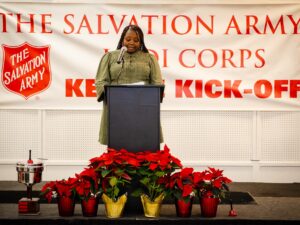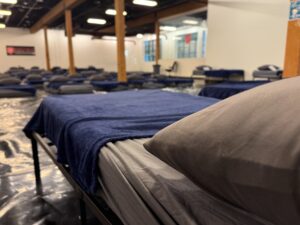
The senseless and vicious massacre of 12 students and a teacher at Littleton Colorado’s Columbine High by two fellow students has traumatized a nation, raised significant questions concerning the distribution of assault weapons and other firearms, and challenged the Army to explore in great detail augmentations to its traditional roles in disasters.
A score of Army officers, including Divisional Comman-der Lt. Col. Harold Brodin, arrived at the scene immediately following the shootings and during the rescue operation itself. Captain Douglas Tollerud assumed logistical responsibilities for canteen operations. Captain Carla Lafayette, divisional youth secretary, and several other officers were pressed into service in crisis counseling roles. “Without minimizing our traditional effort to deliver sustenance to victims and recovery personnel in God’s name,” Lafayette said, “we need to make a stronger effort at being ‘church,’ to provide spiritual comfort to victims in time of need. We were in the gym along with other clergy when parents were notified that their children had been killed. There is, at that moment, a feeling of awesome helplessness in the presence of breaking hearts and a recognition that only God can deal with issues of the heart. There is no place other than God to turn.”
In commenting on the Army’s roles during disaster relief circumstances, Colonel John Bate, national chief secretary, said “This very day we have been seeking to modify the legislation and the legislative history which assigns the Army particular responsibilities in the face of disaster. On occasions, our efforts at spiritual counseling have been inhibited at some disaster sites due to specifics in the law we seek to change.” Bate also said the Army will continue to work to identify this kind of counseling as pertinent to our mission in disaster circumstances.
A Salvation Army canteen and cold truck, along with some 20-30 emergency disaster volunteers, Salvation Army officers and advisory board members served more than 2,500 meals to law enforcement, emergency personnel, students and their families in the first two days. The second day of the tragedy, rain moved in during the students’ evening vigil, and the Army provided blankets and socks to the hundreds of teen-agers who were gathered in remembrance of those who had lost their lives. Salvation Army officers also offered a shoulder to cry on and opportunities to pray and talk about what they were experiencing and feeling.
The Salvation Army was also called upon to provide interviews for the international media. Army employees fluent in Spanish and German conducted interviews with television stations.
“The Salvation Army will continue to provide whatever assistance is needed, not only at the scene of the tragedy but in the difficult weeks and months that are ahead for the families and relief workers and for the community at large,” stated Divisional Commander Lt. Colonel Harold Brodin.
–with reporting by Christy Ziemba











